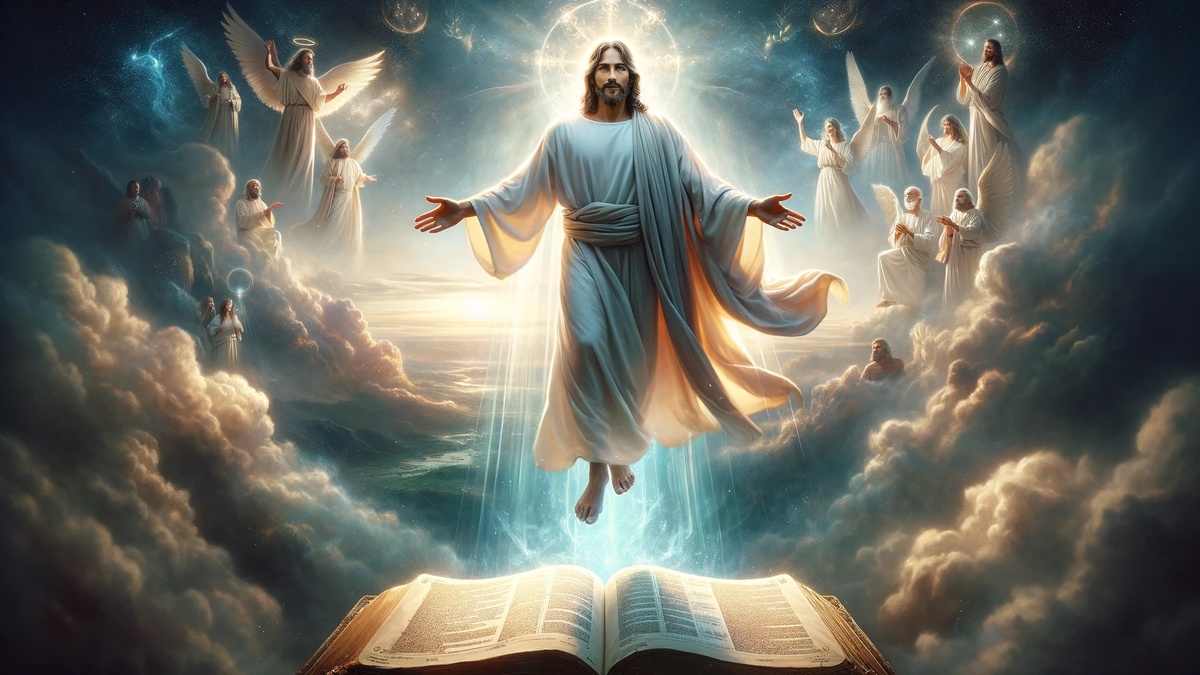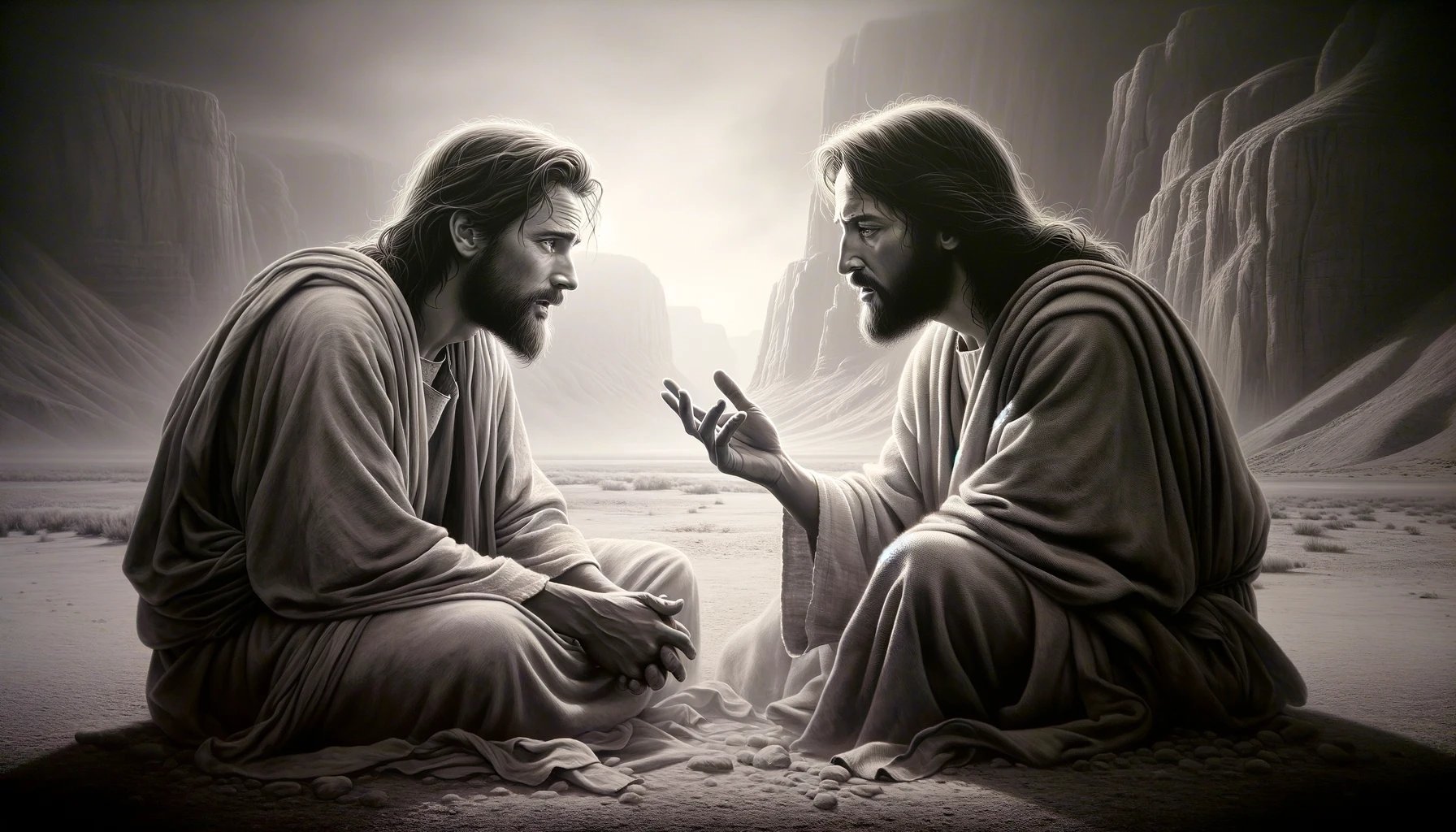Home>Christian Videos>Bible Stories>What Does The Quran Say About Jesus Christ


Bible Stories
What Does The Quran Say About Jesus Christ
Published: February 29, 2024
Jason DeRose, Managing Editor at Christian.net, uses his expertise in religion and journalism to deepen understanding of faith's societal impacts. His editorial leadership, coupled with a strong academic background, enriches the platform’s diverse content, earning him recognition in both journalism and religious circles.
Discover what the Quran reveals about Jesus Christ and explore the connections between Quranic teachings and Bible stories. Uncover the significance of Jesus in Islamic faith.
(Many of the links in this article redirect to a specific reviewed product. Your purchase of these products through affiliate links helps to generate commission for Christian.net, at no extra cost. Learn more)
Table of Contents
Introduction
What does the Quran say about Jesus Christ? This is a question that has intrigued scholars, theologians, and believers for centuries. The Quran, the holy book of Islam, contains several references to Jesus, also known as Isa in Arabic. These references shed light on the Islamic perspective of Jesus and his significance in the faith. In this article, we will explore the portrayal of Jesus Christ in the Quran, his miracles as mentioned in the holy book, his status in Islam, and the Quranic account of his crucifixion and resurrection. Through this exploration, we aim to provide a comprehensive understanding of the Quran's perspective on Jesus Christ.
Jesus Christ in the Quran
Jesus Christ, known as Isa in Arabic, is prominently mentioned in the Quran. He is revered as one of the mightiest messengers of God and holds a significant place in Islamic belief. The Quran acknowledges Jesus as the son of Mary, a virtuous and pious woman who was chosen by God for the miraculous birth of Jesus without a father. The Quranic verses emphasize the miraculous nature of Jesus' birth, highlighting that it was a divine intervention and a sign of God's omnipotence. The Quranic portrayal of Jesus underscores his noble lineage and his role as a prophet who was entrusted with the mission of calling people to the worship of the One true God. The Quranic narrative of Jesus Christ serves to affirm his esteemed position in Islam and to emphasize the importance of his teachings and example for believers.
Jesus' presence in the Quran is a testament to his revered status in Islam. The Quranic verses that mention Jesus depict him as a figure of great wisdom, compassion, and spiritual insight. His teachings, known as the Injil (Gospel), are regarded as a source of divine guidance for humanity. The Quranic portrayal of Jesus Christ aligns with the Islamic belief in the succession of prophets, with Jesus being a pivotal figure in the line of prophethood. His exemplary character, unwavering devotion to God, and his mission to guide the people towards righteousness are emphasized in the Quran, reinforcing the profound respect and admiration accorded to Jesus in Islamic tradition.
The Quranic depiction of Jesus Christ also addresses misconceptions and misrepresentations that have arisen regarding his nature and mission. It clarifies that, while Jesus is honored as a distinguished prophet, he is not divine, nor the literal son of God. The Quran emphasizes the oneness of God and rejects the concept of a divine progeny, affirming that Jesus, like all prophets, was a servant of God chosen to fulfill a specific role in the divine plan. This distinction is crucial in understanding the Islamic perspective on Jesus Christ and serves to differentiate it from certain Christian theological interpretations.
In summary, the Quranic portrayal of Jesus Christ offers a profound insight into the Islamic perspective on this revered figure. It underscores his esteemed position as a noble prophet, a miraculous birth, and a messenger of God, while also dispelling misconceptions about his nature. The Quranic narrative of Jesus Christ serves to inspire believers with his exemplary character, unwavering devotion to God, and his pivotal role in the continuum of prophethood.
The Miracles of Jesus in the Quran
-
The Miracle of Speaking as an Infant: The Quran recounts the extraordinary miracle of Jesus speaking as an infant in the cradle, defending his mother Mary against the accusations of her chastity. This miraculous event serves as a testament to Jesus' prophetic mission and divine favor, showcasing his exceptional abilities from a young age.
-
Healing the Blind and the Lepers: The Quran highlights Jesus' ability to heal the blind and the lepers through the permission of God. These miraculous acts of healing demonstrate Jesus' compassion and his role as a divine agent, empowered to alleviate the suffering of the afflicted through the will of God.
-
Reviving the Dead: Another remarkable miracle attributed to Jesus in the Quran is the revival of the dead by God's leave. This awe-inspiring feat underscores Jesus' divine commission and his authority over life and death, affirming his status as a chosen emissary of God with extraordinary capabilities.
-
Creating Birds from Clay: The Quran narrates the miraculous incident where Jesus, with the permission of God, fashioned birds from clay and brought them to life. This extraordinary demonstration of creative power signifies Jesus' unique connection to the divine and his ability to manifest miracles as a sign of God's omnipotence.
-
Knowledge of the Unseen: The Quran attributes to Jesus the knowledge of the unseen, allowing him to inform the people of what they ate and stored in their houses. This miraculous awareness serves as a testament to Jesus' prophetic insight and his intimate connection with the divine realm, reinforcing his role as a chosen messenger of God.
The Quranic portrayal of the miracles of Jesus serves to emphasize his exceptional status as a prophet endowed with extraordinary abilities by the will of God. These miracles are depicted as signs of God's power and mercy, manifested through Jesus to affirm his divine mission and to guide humanity towards faith and righteousness.
The Status of Jesus in Islam
In Islam, Jesus holds a revered and exalted status as a distinguished prophet and messenger of God. The Quran portrays Jesus, known as Isa in Arabic, as a figure of immense wisdom, compassion, and spiritual insight. His noble lineage, miraculous birth, and unwavering devotion to God underscore his esteemed position in Islamic belief. Jesus is honored as one of the mightiest messengers of God, entrusted with the mission of calling people to the worship of the One true God and guiding them towards righteousness. His teachings, known as the Injil (Gospel), are regarded as a source of divine guidance for humanity, emphasizing his pivotal role in imparting God's message to the world.
The status of Jesus in Islam is characterized by profound respect and admiration, as he is revered for his exemplary character and his unwavering commitment to fulfilling his divine mission. The Quranic narrative of Jesus Christ aligns with the Islamic belief in the succession of prophets, with Jesus being a pivotal figure in the line of prophethood. His role as a compassionate teacher, a healer, and a spiritual guide exemplifies his significance in Islamic tradition, inspiring believers with his profound wisdom and devotion to God.
Furthermore, the Quranic portrayal of Jesus Christ serves to dispel misconceptions and misrepresentations about his nature and mission. While Jesus is honored as a distinguished prophet, the Quran emphasizes that he is not divine, nor the literal son of God. Instead, he is regarded as a servant of God chosen to fulfill a specific role in the divine plan. This distinction is crucial in understanding the Islamic perspective on Jesus Christ and serves to differentiate it from certain Christian theological interpretations.
In summary, the status of Jesus in Islam is marked by deep reverence, acknowledging his pivotal role as a noble prophet and messenger of God. His exemplary character, unwavering devotion to God, and his mission to guide people towards righteousness are central to his esteemed position in Islamic belief. The Quranic portrayal of Jesus Christ serves to inspire believers with his profound wisdom, compassion, and unwavering commitment to fulfilling his divine mission, reinforcing his exalted status in Islamic tradition.
Jesus' Crucifixion and Resurrection in the Quran
The Quranic perspective on the crucifixion and resurrection of Jesus Christ diverges from certain Christian beliefs, presenting a distinct narrative that emphasizes the sovereignty and wisdom of God. The Quran addresses the crucifixion of Jesus in a manner that challenges traditional Christian interpretations, offering an alternative account that underscores the divine plan and the ultimate protection of Jesus by God.
According to the Quran, the crucifixion of Jesus is a subject of profound significance and theological divergence. The Quranic narrative explicitly states that Jesus was not crucified, but rather, it appeared so to the observers. This pivotal divergence from the traditional Christian belief in the crucifixion of Jesus serves to emphasize the transcendence of God's wisdom and the preservation of Jesus from the indignity of crucifixion. The Quranic account of the crucifixion challenges conventional perceptions, highlighting the sovereignty of God's decree and the ultimate protection of Jesus from the fate of crucifixion.
The Quranic portrayal of the crucifixion of Jesus underscores the divine plan and the enigmatic nature of God's will. It elucidates that Jesus was not crucified, but instead, God raised him to Himself. This profound assertion in the Quranic narrative serves to affirm the transcendence of God's wisdom and the ultimate protection of Jesus from the events surrounding the crucifixion. The Quranic account of the crucifixion and the subsequent elevation of Jesus by God underscores the divine sovereignty and the inscrutable nature of God's decree, offering a distinct perspective on this pivotal event in Christian theology.
Furthermore, the Quranic narrative of Jesus' crucifixion and resurrection serves to emphasize the profound wisdom and mercy of God. It elucidates that while the events surrounding Jesus' fate may have appeared perplexing to the observers, they were ultimately part of God's divine plan. The Quranic account of Jesus' crucifixion and subsequent elevation by God underscores the enigmatic nature of God's will and the ultimate protection accorded to Jesus, affirming the sovereignty and mercy of God's decree.
In summary, the Quranic perspective on the crucifixion and resurrection of Jesus Christ offers a distinct narrative that challenges traditional Christian beliefs. The Quranic account emphasizes the transcendence of God's wisdom, the ultimate protection of Jesus from the fate of crucifixion, and the enigmatic nature of God's decree. This portrayal serves to underscore the sovereignty and mercy of God, offering a unique perspective on this pivotal event in Christian theology.
Read more: What Does Buddhism Say About Jesus Christ
Conclusion
In conclusion, the Quranic portrayal of Jesus Christ offers a profound insight into the Islamic perspective on this revered figure. The Quran acknowledges Jesus as one of the mightiest messengers of God, emphasizing his noble lineage, miraculous birth, and unwavering devotion to God. His status as a distinguished prophet and messenger of God is characterized by deep reverence and admiration in Islamic tradition. The Quranic narrative of Jesus Christ serves to inspire believers with his exemplary character, profound wisdom, and unwavering commitment to fulfilling his divine mission.
The miracles attributed to Jesus in the Quran, including speaking as an infant, healing the blind and the lepers, reviving the dead, creating birds from clay, and possessing knowledge of the unseen, underscore his exceptional status as a prophet endowed with extraordinary abilities by the will of God. These miracles are depicted as signs of God's power and mercy, manifested through Jesus to affirm his divine mission and to guide humanity towards faith and righteousness.
Furthermore, the Quranic perspective on the crucifixion and resurrection of Jesus Christ offers a distinct narrative that challenges traditional Christian beliefs. The Quranic account emphasizes the transcendence of God's wisdom, the ultimate protection of Jesus from the fate of crucifixion, and the enigmatic nature of God's decree. This portrayal serves to underscore the sovereignty and mercy of God, offering a unique perspective on this pivotal event in Christian theology.
Overall, the Quranic portrayal of Jesus Christ in the Quran provides a comprehensive understanding of the Islamic perspective on this revered figure, emphasizing his esteemed position as a noble prophet, a miraculous birth, and a messenger of God. It serves to inspire believers with his exemplary character, unwavering devotion to God, and his pivotal role in the continuum of prophethood.














